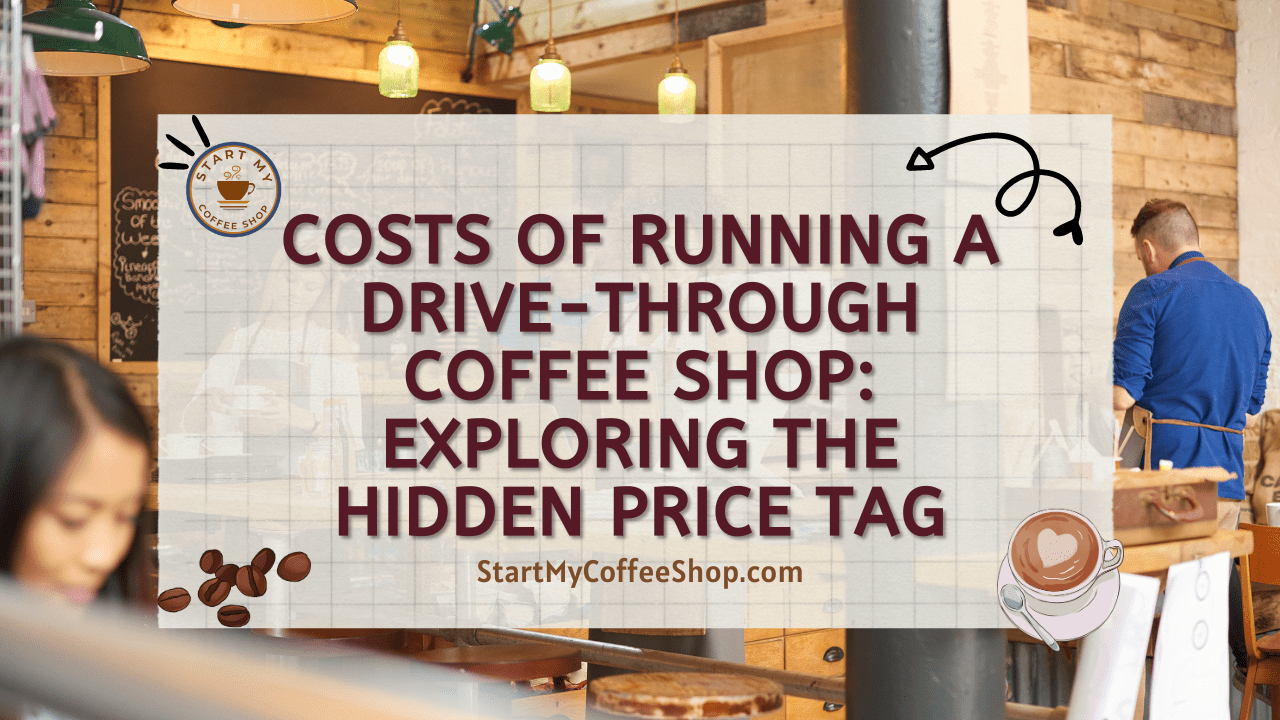In recent years, drive-through coffee shops have become increasingly popular, offering convenience and quick service to coffee lovers on the go. While owning and operating a drive-through coffee shop can be a great business opportunity, it’s essential to understand the various costs involved.
The cost of running a drive-through coffee shop can vary in cost depending on factors like location, size, and infrastructure requirements. On average, it can range from $100,000 to $500,000 or more, including real estate, equipment, and initial operational expenses.
In this article, I will explore the hidden expenses associated with running a drive-through coffee shop, shedding light on factors beyond the initial investment.
1. Location and Real Estate Costs:
The expenses related to real estate can encompass lease or purchase costs, property taxes, and insurance premiums. These costs vary depending on the location’s desirability, local market conditions, and the duration of the lease agreement.
Drive-through coffee shops situated in high-demand areas, such as busy intersections or near office complexes, tend to command higher lease or purchase prices.
In addition to the base real estate expenses, drive-through coffee shop owners must also consider potential renovations or modifications to the property. Adapting the location to accommodate drive-through infrastructure requires careful planning and budgeting.

This may include constructing drive lanes, installing menu boards and speaker systems, and ensuring sufficient space for customer queuing. Renovations can significantly impact the overall budget, especially if substantial modifications are required.
Moreover, drive-through coffee shops need to account for ongoing maintenance and repair costs associated with their property. Ensuring that the drive-through infrastructure remains in optimal condition is essential for seamless operations and customer satisfaction.
These maintenance expenses can include repairs to speaker systems, menu boards, or even structural elements of the drive-through lane.
Insurance premiums are another factor that drive-through coffee shop owners need to consider. Protecting the business against potential risks and liabilities is crucial. Insurance coverage typically includes general liability, property insurance, and workers’ compensation.
The cost of insurance premiums depends on factors such as the location’s crime rate, the size of the business, and the coverage limits chosen.
Read more about Cost to Open Scooter’s Coffee Shop: Mapping Out the Financial Landscape
2. Drive-Through Infrastructure:
Creating a drive-through lane for a coffee shop entails more than just constructing a building. It involves the installation of various essential components to facilitate efficient and seamless operations. These components typically include speaker systems, menu boards, order confirmation screens, and payment terminals. However, these necessary elements come with their costs.
The expenses associated with installing drive-through infrastructure can be significant. Speaker systems are essential for clear communication between customers and employees, ensuring accurate order-taking. The cost of high-quality speakers, along with the necessary wiring and installation, adds to the overall budget.
Similarly, menu boards play a vital role in displaying the available options and prices to customers. Investing in modern and eye-catching menu boards can enhance the overall customer experience, but they come with their price tag.
Order confirmation screens are another integral part of the drive-through process. They provide a visual representation of the customer’s order, ensuring accuracy and minimizing errors.
These screens require appropriate technology and installation, which contribute to the overall expenses of setting up a drive-through coffee shop.
Payment terminals are crucial for smooth and convenient transactions. From card readers to contactless payment options, providing various payment methods is essential in today’s digital era. However, acquiring and installing reliable payment terminals can be costly. Additionally, ongoing maintenance and software updates may be required to ensure their functionality.
It’s important not to overlook the ongoing maintenance and repair costs associated with drive-through infrastructure. Regular wear and tear, exposure to the elements, and potential technological issues necessitate periodic maintenance and occasional repairs.
These costs should be factored into the budget to ensure uninterrupted service and minimize downtime that could impact customer satisfaction.
3. Equipment and Supplies:
Espresso machines are the heart of any coffee shop, allowing baristas to craft delicious espresso-based beverages. These machines come in various types and sizes, with costs ranging from a few thousand dollars to tens of thousands, depending on their features and capabilities. Coffee grinders are essential for freshly grinding coffee beans, ensuring optimal flavor extraction. Quality grinders can range in price, depending on their precision and durability.
Blenders are necessary for creating blended and iced coffee beverages, adding versatility to the menu. These appliances need to be powerful and efficient to handle the demands of blending ingredients smoothly. Additionally, refrigeration units are crucial for storing perishable items like milk, cream, and syrups at the proper temperature, ensuring freshness and food safety.
In addition to equipment, drive-through coffee shops need a steady supply of various consumable items. Coffee beans, the lifeblood of the business, need to be regularly sourced and restocked.
The cost of coffee beans can vary depending on factors such as origin, quality, and the supplier. Milk, whether dairy or non-dairy alternatives, is another essential ingredient that requires regular replenishment.
Syrups, flavorings, and condiments are crucial for providing a diverse range of beverage options. Cups, lids, stirrers, and other disposables also need to be consistently restocked to serve customers efficiently. These ongoing supply expenses contribute to the operational costs of running a drive-through coffee shop.
Moreover, drive-through coffee shops must consider ongoing maintenance and repairs for their equipment. Regular cleaning, calibration, and occasional repairs are necessary to keep the equipment in optimal working condition. These maintenance costs should be factored into the budget to ensure that the equipment remains reliable and operational.
4. Staffing and Training:
Creating an efficient and customer-oriented drive-through coffee shop requires the recruitment of a dedicated and skilled team. The costs associated with staffing go beyond wages and encompass several factors, including benefits, payroll taxes, and training programs.
One of the primary staffing expenses is wages. Baristas, shift supervisors, and other team members are the face of the drive-through coffee shop, interacting directly with customers and preparing their beverages. Ensuring competitive wages helps attract and retain talented individuals who are passionate about delivering exceptional service.
Benefits are another important aspect of staffing costs. Providing benefits such as health insurance, retirement plans, paid time off, and employee discounts can contribute significantly to the overall expenses. These benefits not only support the well-being and job satisfaction of employees but also enhance their loyalty and dedication to the coffee shop.

Payroll taxes, including Social Security and Medicare contributions, must be factored into the staffing costs as well. Employers are responsible for withholding and remitting these taxes on behalf of their employees, and the rates vary based on applicable laws and regulations.
Continuous training and development programs are crucial for maintaining the quality and consistency of the coffee shop’s offerings. Investing in barista training ensures that the team members have the necessary skills to prepare specialty coffee beverages to the highest standards.
Training programs may cover areas such as espresso extraction techniques, milk steaming, latte art, and customer service. These programs help elevate the coffee shop’s reputation and provide a consistent experience for customers.
Furthermore, ongoing training and development opportunities contribute to employee engagement and job satisfaction. Baristas who feel supported and empowered through training programs are more likely to deliver exceptional service and foster customer loyalty. Allocating a portion of the budget to training demonstrates the coffee shop’s commitment to employee growth and development.
Additionally, it’s important to consider the indirect costs associated with staffing, such as recruiting expenses, uniforms, and employee turnover. Advertising job openings, conducting interviews, and onboarding new hires all incur costs. Providing uniforms or dress code-compliant attire for the staff adds to the initial investment. Moreover, employee turnover can lead to additional expenses in terms of recruitment and training for new hires.
Read more about Cost to Run a Small Coffee Shop: Setting the Budget for Your Coffee Shop
5. Operational Expenses:
In addition to the upfront and ongoing costs previously discussed, there are several day-to-day expenses involved in running a drive-through coffee shop. These expenses cover essential aspects of the business, ensuring smooth operations and a pleasant customer experience.
Utility costs are a significant consideration for any business, including a drive-through coffee shop. Electricity powers the equipment, lighting, and other electrical systems within the establishment. Water is required for beverage preparation, cleaning, and restroom facilities. Gas may be used for heating, cooking, or operating specific equipment. Monitoring and managing utility consumption is crucial for cost control and sustainability.
Waste disposal services are essential for maintaining cleanliness and adhering to health and safety standards. Regular trash collection and recycling services ensure proper waste management. These services typically come with recurring fees that should be factored into the operational costs.
To maintain a clean and inviting environment, cleaning supplies are necessary. These include sanitizing solutions, detergents, paper towels, and other materials for routine cleaning tasks. Keeping the drive-through area, restrooms, and other customer-accessible areas clean and well-maintained contributes to a positive impression and customer satisfaction.
Ensuring the security of the premises and the safety of employees and customers is paramount. Installing and maintaining security systems, such as surveillance cameras, alarms, and access control systems, helps deter theft and provides a sense of safety. Investing in reliable security measures is essential for protecting assets and maintaining a secure environment.
Pest control is another ongoing expense that drive-through coffee shops must consider. Regular inspections and treatments by professional pest control services help prevent infestations and maintain a hygienic environment. Addressing pest issues promptly not only ensures compliance with health and safety regulations but also protects the reputation of the coffee shop.
Obtaining the necessary licenses and permits is essential to operate a drive-through coffee shop legally. These licenses and permits may include health department permits, food handling certifications, business licenses, and signage permits. Fees associated with obtaining and renewing these licenses and permits should be considered when calculating the overall operational costs.
Marketing and advertising costs play a crucial role in attracting customers and promoting the drive-through coffee shop. Traditional marketing channels, such as print advertisements, billboards, and local promotions, as well as digital marketing strategies like social media advertising and online listings, require budget allocation. Effective marketing campaigns help increase brand visibility and drive customer traffic.
Lastly, technology expenses, such as point-of-sale (POS) systems, should be factored into the operational budget. A reliable POS system facilitates smooth transactions, inventory management, and sales reporting. It streamlines operations and enhances customer service efficiency.
6. Inventory Management:
Efficient inventory management is a critical aspect of running a drive-through coffee shop to minimize wastage and uphold the quality and freshness of products. Coffee shops must diligently monitor and restock their inventory of ingredients, milk, baked goods, and other perishable items. The costs associated with inventory management encompass various factors, including ordering, tracking, storage, and potential losses due to spoilage or expiration.
Ordering the right quantity of ingredients and supplies is essential to meet customer demand without excess waste. Coffee beans, syrups, flavorings, and other ingredients must be carefully monitored to ensure an adequate supply while avoiding overstocking. By analyzing sales trends, monitoring customer preferences, and using inventory management systems, coffee shop owners can optimize their ordering processes, reducing the risk of excess inventory and potential financial losses.
Tracking inventory is crucial to maintain accurate stock levels and avoid product shortages. Implementing inventory management software or manual tracking systems enables coffee shop owners to monitor ingredient usage, track expiration dates, and identify items that require replenishment. Regular inventory counts help identify any discrepancies and ensure accurate stock records.
Proper storage is vital to preserving the freshness and quality of perishable items. Coffee beans should be stored in airtight containers in a cool and dry environment to maintain their flavor. Milk and other dairy products require refrigeration at appropriate temperatures to prevent spoilage. Baked goods should be stored in airtight containers or display cases to maintain their texture and taste. Investing in suitable storage solutions, such as refrigerators, freezers, and shelving units, is crucial for effective inventory management.
Unfortunately, losses due to spoilage or expiration are inevitable in the food and beverage industry. Coffee shops need to account for potential losses and factor them into the overall operational costs. Developing strategies to minimize waste, such as implementing first-in, first-out (FIFO) inventory rotation and closely monitoring expiration dates, can help reduce losses and maximize profitability.
By effectively managing inventory, coffee shops can minimize waste, control costs, and ensure the availability of fresh ingredients and products for customers. Regular inventory assessments, accurate tracking, proper storage, and strategies to minimize waste are key elements in achieving efficient inventory management. This not only contributes to financial stability but also maintains the high quality and customer satisfaction that drive-through coffee shops strive to deliver.
7. Marketing and Promotions:

Building a strong brand presence and attracting customers to a drive-through coffee shop is a result of strategic marketing and promotional efforts. These initiatives can take various forms, including digital advertising, social media campaigns, local events sponsorship, loyalty programs, and partnerships with nearby businesses. Allocating a portion of the budget to these marketing initiatives is crucial for driving customer acquisition and retention.
In today’s digital age, online advertising plays a significant role in reaching a wide audience. Utilizing digital advertising channels, such as search engine marketing, display ads, and social media advertising, allows drive-through coffee shops to target specific demographics and geographic areas. By crafting compelling ad copy and captivating visuals, coffee shops can effectively communicate their brand values and unique offerings to potential customers.
Social media platforms have become powerful marketing tools, providing opportunities to engage with the target audience and build an online community. Coffee shops can leverage platforms like Facebook, Instagram, Twitter, and TikTok to share visually appealing content, behind-the-scenes glimpses, special promotions, and customer testimonials. Engaging with followers, responding to comments and messages, and running social media campaigns can create a sense of connection and loyalty among customers.
Sponsoring or participating in local events can help drive brand awareness and community engagement. Coffee shops can collaborate with organizations, schools, or charities to support events or fundraisers. This involvement not only creates positive brand associations but also provides opportunities to showcase the coffee shop’s products and services to a local audience.
Implementing a loyalty program is an effective way to encourage repeat business and foster customer loyalty. Offering rewards, discounts, or exclusive perks to loyal customers incentivizes them to choose the drive-through coffee shop over competitors. By collecting customer data through loyalty programs, coffee shops can also gain valuable insights to personalize marketing efforts and better understand customer preferences.
Forming partnerships with nearby businesses can be mutually beneficial. Collaborations with local bakeries, gyms, or offices can lead to cross-promotion opportunities and increased foot traffic. For example, offering a discount to customers who present a receipt from a partnering business can drive new customers to the drive-through coffee shop while also supporting the local community.
Allocating a portion of the budget to marketing initiatives demonstrates the drive-through coffee shop’s commitment to building a strong brand presence and attracting customers. By carefully planning and executing strategic marketing campaigns, coffee shops can effectively communicate their unique value proposition, engage with customers, and foster long-term loyalty.
Read more about Cost to Start Coffee Shop Business: The Unfiltered Finances
8. Insurance and Legal Considerations:
Protecting the drive-through coffee shop from potential liabilities is a critical aspect of business management. Owners must prioritize investing in comprehensive insurance coverage to mitigate risks and ensure financial security. The types of insurance that drive-through coffee shop owners should consider include general liability, workers’ compensation, and property insurance.
General liability insurance protects the coffee shop against claims for bodily injury, property damage, or personal injury that may occur on the premises or as a result of the coffee shop’s operations. This coverage provides financial protection in the event of accidents, slip and fall incidents, or customer injuries. It also extends to product liability, covering any harm caused by the coffee shop’s products.
Workers’ compensation insurance is essential for covering employees in the event of work-related injuries or illnesses. This insurance provides medical coverage, wage replacement, and rehabilitation services for employees who experience job-related accidents or develop work-related health conditions. Workers’ compensation not only protects employees but also safeguards the coffee shop from potential legal disputes and financial burdens.
Property insurance safeguards the physical assets of the drive-through coffee shop. It covers the building structure, equipment, furniture, and inventory against damages caused by fire, theft, vandalism, or natural disasters. Property insurance ensures that the coffee shop can recover and rebuild in the event of unforeseen circumstances, minimizing financial losses.
In addition to insurance expenses, drive-through coffee shop owners should consider the legal fees associated with permits, licenses, contracts, and compliance with health and safety regulations. Obtaining the necessary licenses and permits to operate legally may involve application fees and ongoing renewal costs.
Legal counsel may be necessary to review and draft contracts with suppliers, service providers, or business partners. Ensuring compliance with health and safety regulations may require periodic inspections and consultations with legal experts to stay up to date with the evolving regulatory landscape.
Summary
Running a drive-through coffee shop can be an enjoyable venture, but it comes with various costs beyond the initial investment. Understanding and budgeting for hidden expenses is crucial for long-term sustainability and growth.
From location and infrastructure to staffing, equipment, and ongoing operational expenses, careful planning and financial management are vital. By considering these hidden costs, coffee shop owners can navigate the challenges and make informed decisions to thrive in the competitive drive-through coffee industry.
Frequently Asked Questions

Q: What ongoing expenses should I expect when running a drive-through coffee shop?
A: Ongoing expenses for a drive-through coffee shop include staffing costs, equipment maintenance, inventory replenishment, utilities, marketing efforts, insurance premiums, and operational supplies.
Q: Are there any specific permits or licenses required to operate a drive-through coffee shop?
A: Yes. These may include health permits, food handler certifications, zoning permits, signage permits, and compliance with local regulations regarding parking and drive-through operations.
Q: How much does staffing contribute to the overall costs?
A: It includes wages, payroll taxes, benefits, and training expenses. The number of employees needed depends on the shop’s size and the expected customer volume during peak hours.
To learn more on how to start your own coffee shop checkout my startup documents here
Please note: This blog post is for educational purposes only and does not constitute legal advice. Please consult a legal expert to address your specific needs.

Hi! I’m Shawn Chun
My adventure in coffee began when I first launched my first coffee shop back in the early 2000s. I had to figure out so many things on my own and to make it worse within 2 years of opening two large corporate coffee chains moved in just blocks away from me!
As I saw smaller and even some larger coffee shops in the neighborhood slowly lose customers to these giant coffee chains and slowly close up shop, I knew that I had to start getting creative…or go out of business.
I (like you may be) knew the coffee industry well. I could make the best latte art around and the foam on my caps was the fluffiest you have ever seen. I even had the best state-of-the-art 2 group digital Nuova Simonelli machine money could buy. But I knew that these things alone would not be enough to lure customers away from the name brand established coffee shops.
Eventually, through lots of trial and error as well as perseverance and creativity I did find a way to not only survive but also thrive in the coffee/espresso industry even while those corporate coffee chains stayed put. During those years I learned to adapt and always faced new challenges. It was not always easy, however, in the end, I was the sole survivor independent coffee shop within a 10-mile radius of my location. Just two corporate coffee chains and I were left after that year. All told the corporate coffee chains took down over 15 small independent coffee shops and kiosks and I was the last one standing and thriving.
Along the years I meet others with the same passion for coffee and I quickly learned that it is not only “how good a barista is” that makes a coffee shop successful, but the business side of coffee as well.
Hence why I started this website you are on now. To provide the tools and resources for up and coming coffee shop owners to gain that vital insight and knowledge on how to start a coffee shop successfully.
Stick around, browse through my helpful blog and resources and enjoy your stay! With lots of LATTE LOVE!
Shawn







